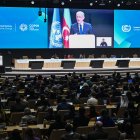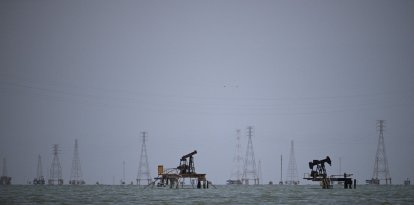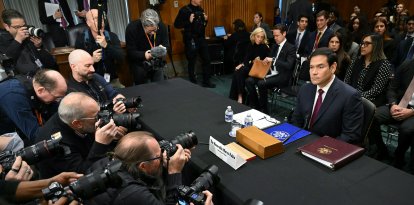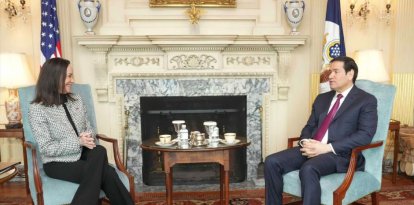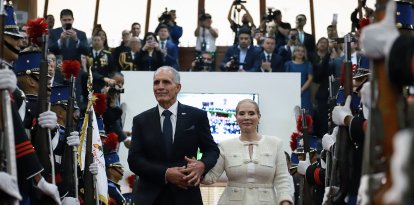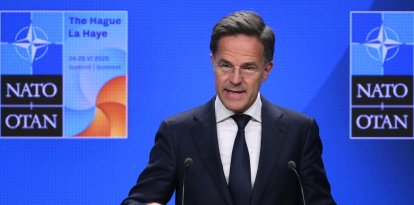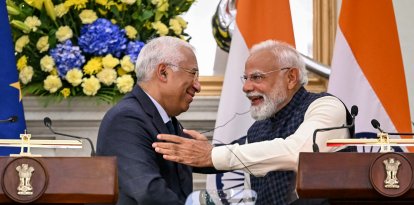Geopolitical tensions overshadow COP29 climate summit and quite possibly the UN's utopian plans
France, one of the main proponents of the UN climate agenda, faces an open diplomatic conflict with Azerbaijan, the host country of the summit. For its part, Argentina surprised the world by announcing the withdrawal of its delegation.

An image from the COP29 summit
Since 1995, the COP has been the main annual climate summit to assess the progress of countries that have committed to, among other things, reducing their emissions under international agreements, such as the Paris Treaty. However, this year's COP29 held in Baku, capital of Azerbaijan, is proving bittersweet for organizations, activists and governments fighting against "climate change" seeing geopolitical tensions overshadow the very course of the summit and the United Nations' utopian plans for zero emissions.
From the outset, tensions have been palpable, mainly because of the host country, Azerbaijan, whose president, Ilham Aliyev, said during the event that oil and gas are "a gift from god." Because of this stance, considered incompatible with UN goals and the Paris Agreement commitment, radical green activists have questioned Baku's hosting of the year's most important climate conference. One of them was Greta Thunberg herself, who called the host country an "authoritarian petro-state."
But beyond the criticism of Azerbaijan for its policies in favor of exploiting resources such as oil and gas, another fact that has marked the summit is the host country's latent conflict with France, one of the countries that most promotes the UN climate agenda.
Historical relations between Azerbaijan and France have been delicate due to France backing Armenia, Azerbaijan's rival.
So it came as no surprise that on Wednesday, Nov. 13, France's climate minister, Agnès Pannier-Runacher, canceled her trip to COP29 after President Aliyev accused the European country of "crimes" in its overseas territories in the Caribbean in a new exchange between the two nations. Earlier this year, Paris had accused Baku of interfering and fomenting violent unrest in New Caledonia.
In other words, in a crucial year for the UN's climate aspirations, one of its leaders, France, is in full conflict with the host country of the summit.
Another clear example of geopolitical tension was in UK Prime Minister Keir Starmer's cryptic message to the United States, suggesting that if Washington abandons its leadership role in the climate agenda, the UK would be ready to take it over.
According to Starmer, the "lesson of history" indicates that countries that act early during energy transitions reap big benefits.
"The way I see it, there are two paths ahead," Starmer told a press conference at the Baku summit. "One, the path of inaction and delay leading to further decline and vulnerability. Warming above 1.5C (2.7F) will expose hundreds of thousands more people in the U.K. to flood risk, greater economic instability and national insecurity."
"Or second, the path we walk, eyes wide open not just to the challenges of today, but also fixed firmly on the opportunities of tomorrow. This is the path towards national security, energy independence and the economic stability necessary to boost living standards for working people," the prime minister added. "[There can be] no global security without climate security."
Starmer's message came after Donald Trump swept the 2024 presidential election and became the new president-elect. During the campaign, the Republican front-runner promised that the United States would again pull out of the Paris Agreement, as happened during his first term. It is also expected that the president-elect will promote an economy that takes advantage of its natural resources through practices such as fracking.
In addition, some developing countries have deviated from their historical stance of absolute subscription to UN climate agreements. The most emblematic case is Argentina, a country led by libertarian president Javier Milei.
On Wednesday, Buenos Aires surprised the world by withdrawing its delegation from COP29. The South American country's presidential spokesman, Manuel Adorni said the move would allow the new foreign minister, Gerardo Werthein, to "reevaluate the situation and reflect on the position."
"The minister is withdrawing the delegation by virtue of a whole reform he will carry out. There is not much more to say," said Adorni.
Adorni's words, for some analysts, suppose that Argentina could withdraw from the Paris Agreement, a decision that would undoubtedly generate a paradigm shift in the region, as it would be a blow to the UN's global plans and its "common" climate agenda.
Normally, the vision of the supranational organization is not in line with the sovereign needs of developing nations, and Argentina could be taking a historic step by becoming one of the first states in the region to opt out of the Paris Agreement, which it ratified in 2016. Perhaps it could be an impetus for other countries to follow Argentina's example.
In fact, in statements to the The New York Times, Argentine Minister Werthein assured that the country is reevaluating its position on all its signed climate agreements, including the Paris Treaty, which "has a lot of elements" with which the Milei Administration disagrees.
Likewise, when the NYT consulted Werthein on why Argentina is reevaluating its position on climate agreements, the minister assured that the Argentine government does not deny the existence of climate change, but rather debates the causes behind global warming.
“We have different views on the reasons,” Werthein said. “We consider it to be linked to natural cycles, and we agree on the need to take measures to mitigate it.”
Werthein's words coincide with the views of President Milei, whose position on climate change endorses the school of thought that humans have a minor impact on global warming.
The strong and surprising position of the Argentine government comes just when the French President, Emmanuel Macron, is about to make a key trip to South America where he will meet in Buenos Aires with Milei prior to the G20 summit to be held in Brazil.
Some local media revealed that, during the meeting, the French president will lodge a complaint to his Argentine counterpart for his position on climate change.





